ABSTRACT
This study examined the Impact of Online gaming on academic performance of Humanities and Social Science strand, from Nasugbu East Senior High School. Descriptive studies were used in the study to explain its overall conclusions. The sample population for this study consist of Grade11 HUMSS Students. The conclusion implies impact of online gaming on academic performance of senior high school students.
Participants revealed the primary factors that impact student academic performance while incorporating online gaming. Online games have negative effects on students to engage in cooperative learning, share educational materials, and communicate peers and instructors. However, too much play of online games cause distractions and decrease the amount of the students dedicate to their academic task.
Moreover, the researchers recommended that Teacher should Incorporate game design elements into lessons to engage students. Moreover, Parents should Establish rules for gaming time and prioritize homework. And also, Student should Time management, prioritize tasks, allocate time for gaming and academic.
CHAPTER 1
INTRODUCTION
Online gaming is one of the widely used leisure activities by many people. For some people, it is said that playing online games has several reasons to be played, for it can be a stress reliever, challenge and competition, relaxation, enjoyment, social interaction, and even mentally escaping from the real world. The rapid growth of smartphones and high-speed internet has made online gaming more accessible than ever, leading to a rise in the number of young people engaging in online gaming activities.
According to Ahlussanah (2023), online game is one of the impacts that affects learning achievement, makes students addicted to games, decreases learning motivation, and becomes less disciplined with time.
In addition, Yee (2018) found out that young adults play these games just for fun, as a stress reliever, and/or an escape from the household house not knowing that it may lead to poor academic performance.
Researchers at Nasugbu East Senior High School want to evaluate how online gaming affects the academic performance of grade 12 humanities and social science students. They also aimed to gather data on the impact of online games on academic performance among students in order to create educational programs that will offer valuable insights in this topic.
BACKGROUND OF THE STUDY
Research has shown that online games can have negative effects on students to engage in cooperative learning, share educational materials, and communicate with peers and instructors. This can enhance their educational experience and academic achievement by fostering a supportive learning environment.
According to Pandawa (2024), playing online games with a long frequency of time and playing excessively can have a negative influence.
However, too much play of online games can cause distractions and decrease the amount of the students dedicates to their academic task. Research showed that students who dedicate substantial amounts of time to online games might see a decrease in their academic achievement because they spend less time studying and are exposed to more non-academic material. Demir and Kutlu (2018) said that online game addiction negatively affects students’ learning motivation.
STATEMENT OF THE PROBLEM
The study aimed to evaluate the impact of online games on academic performance of grade11 Humanities and Social Science Students in Nasugbu East Senior High School, Barangay Lumbangan Nasugbu Batangas Academic Year 2024-2025.
Specifically, the study sought answers the following question:
1.) How does online gaming impact the social interaction and collaborative skills of students in an academic setting?
2.) How does the frequency of online gaming sessions impact students’ grade and overall academic achievement?
3.) What are the potential solutions to be made improving students’ academic performance while incorporating online gaming?
SCOPE AND LIMITATIONS OF THE STUDY
The study is focused on evaluating the impact of online games on Academic Performance of Grade 11 Humanities Social and Science Students at Nasugbu East Senior High School, Barangay Lumbangan, Nasugbu Batangas. The study was limited only to Humanities and Social Science Students at Nasugbu East Senior High School. The data were solely gathered from the respondents’ answers in the survey questionnaire. The findings were the bases for the proposed educational program for students that will contribute to a deeper understanding of the subject.
DEFINITION OF TERMS
These are the conceptual and operational definitions of the following words and phrases used in this study from r dearer understanding of the research.
Leisure activities Leisure activities are frequently defined as voluntary non-work activities that are engaged in for enjoyment and encompass actions (Daisy Fancourt 2021). In this study, It refers student relaxation, enjoyments, and even mental escaping from the real world.
Playing excessively Playing excessively refers personality and other individual factors in explaining why some players play to excess (Douse & McManus, 1993; Griffiths & Dancaster, 1995; Black, Belsare & Schlosser, 1999; Yang, 2001). In study refers implies giving in to excessive enjoyment or pleasure, often to a point of detriment.
Cooperative Learning Cooperative learning techniques can be loosely categorized by the skill that each enhances (Barkley, Cross and Major, 2005). Cooperative learning is serves as integrated into both research and study, and it can also help to address the problem of the study and work together to solve that.
Distraction Distraction is any factor that diverts attention from academic tasks, potentially leading to reduced focus and productivity (MC Carras, A Kalbarczyk, K Wells, J Banks 2018). Distraction will be evaluated by surveying students about their experiences of difficulty concentrating on schoolwork due to gaming and analyzing any correlations with academic performance.
Online Gaming Online gaming encompasses interactive video games played over the internet, allowing players to engage with others in virtual environments. These games can vary from simple casual games to complex multiplier role-playing games (Green and Bavelier 2003). For this study, online gaming will be quantified by the average number of hours students spend playing internet-based games per week, the types of games they play, and the frequency of their gaming sessions. This data will be collected through self-reported questionnaires and gaming logs.
Academic Performance Academic performance refers to how well students achieve educational objectives, typically assessed through grades, test scores, and overall achievement in their coursework (Griffiths 2008). Academic performance will be assessed using students' GPA, scores from standardized tests, and teacher evaluations of classroom performance. Data will be sourced from school records and academic reports.
Time Management Time management refers to the ability to allocate and use time effectively across various activities, including academic work and leisure (Griffths 2008). Time management will be assessed using self-reported time logs detailing how students divide their time between gaming and studying, as well as academic achievement data.
STRESS RELIEVER Stress relief involves removing stresses in a material, usually by heating it to a temperature at which it can deform easily (Canale, Marino, Scahhi, Griffths 2019). In this study it refers to the people who play online games to relieve their stress.
Social Interaction Social interaction involves engagement with peers and others, which can be influenced by various activities, including online gaming (Vas, Sal, & Nurmi 2009). Social interaction will be assessed through surveys measuring students' time spent interacting online versus in person, and its impact on their academic performance.
Motivation Motivation is the internal drive that influences students' efforts and enthusiasm toward their academic work (Valkenburg, p, m., peter, j. 2011). Motivation will be measured using surveys that assess students' reported levels of interest in their studies and their perceived impact of gaming on their academic drive.
CHAPTER 2
REVIEW OF RELATED LITERATURES
This chapter presents an intensive review of related literatures found to be relevant to the present study. This chapter likewise includes the conceptual and theoretical frameworks, and research simulacrum.
1. Impact of online gaming in social interaction and collaborative skills of students in an academic setting.
According to Jacobs, Jennifer (2016) Gamification, or adding game like elements to non-game activities, has been used widely in a variety of industries to motivate people and is a strategy that educators are now using to motivate students in coursework.
However, Lawson (2023), stated that Online gaming platforms provide players with the opportunity to communicate, strategize, and cooperate with others. Team-based games require players to work together towards a common goal, fostering teamwork and communication skills. These interactions can often lead to strong friendships being formed, transcending the virtual world and impacting real-life relationships.
Homer (2015), Indicated that online games can develop 21st-century skills whereby they can help to improve the student's socio-emotional skills such as collaborating as a team and being involved in problem-solving and communication.
Xu, Z. et al. (2017) investigated the correlation between online gaming frequency and grades, finding that excessive gaming negatively impacts performance. However, regulated gaming fosters improved collaboration and critical thinking in academic settings (Journal of Adolescence).
Vsalampi et al. (2015) explored how gaming can impact social and academic development. They found that while online gaming can facilitate social interactions and teamwork, it can also lead to a decline in academic performance if not balanced properly. Their research emphasizes the importance of understanding the broader context in which gaming occurs and its interplay with academic life.
2. Impact of online gaming session to student's grade and overall academic achievement.
According to Garcia et al. (2018), sstudents primary motivation in playing was for entertainment. There was a moderate negative effect of playing online games on their academic performance in assignments, quizzes, class recitation, paper works and examinations. Online gaming can negatively influence school performance by displacing time that would have been spent in other educational activities such as reading and homework.
According to Homer (2015), despite the obvious negative effects of online games, there are arguments about the positive effects of online gaming on student performance. When online games became a trend, researchers started to venture into education, with innovative and refined ideas embedded in the design of game-based learning. Besides that, the design of online games had also ensured different learning experiences are being engaged on an affective, behavioral, cognitive, and sociocultural level.
Lopez and Tucker (2019) analyzed gamification's role in education, reporting positive impacts on student motivation, engagement, and academic achievement when games encouraged peer interaction and collaboration (Educational Technology Research).
According to Chen and Lu (2015) online gaming affects academic achievement among university students, indicating that excessive gaming is linked with lower academic grades and reduced study time.
THEORETICAL FRAMEWORK
This study was anchored on the Kevin Smits (2019) input hypothesis. This theory studied the relation between online games and learning, that good games incorporate opportunities for the player to learn, for example, ways of problem solving.
Kevin hypothesis suggested that playing online games has become an increasingly popular way of spending leisure time, especially among youth. It was found that playing video games and listening tests significantly correlate. Finally, both voiced as well as written communication online seem to have a significant positive correlation with mean grades.
The theoretical perspective is applicable in the present studies about the impact of online games. The interconnections of this concept linked the impact of online games in academic performance of grade 11 students in Nasugbu East Senior High School relative to knowledge, creative skills, behavior and perspectives.
Moreover, acknowledging the importance of this theory would strengthen the crafting of learning materials to the impact of online games in academic performance as it will provide substantial parameters for inputs in its realization.
CONCEPTUAL FRAMEWORK
Based on the explained conceptual theory use in this study, the researchers found out the impact of online gaming on the academic performance of students. It explores the multifaceted relationship between these variables, considering potential positive and negative influences.
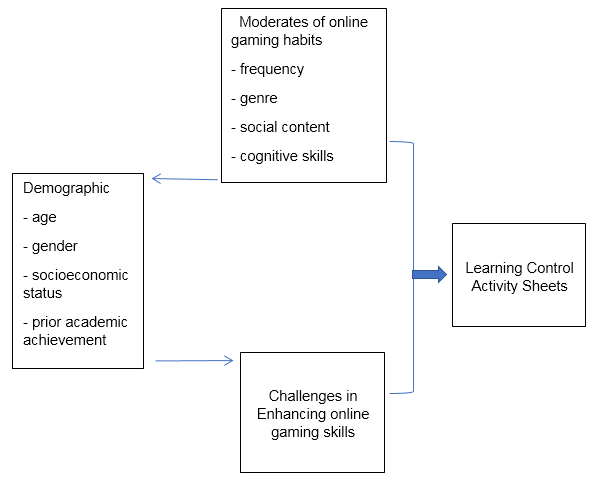
Figure (1) illustrates the research simulacrum of the study. It shows the relationship of moderated of online gaming habits (frequency, genre, social context, cognitive skills) and the challenges in evaluating online games that effect the performance of the students. Hence, impact of variables is determined. The findings of this study adhere to formulate learning control of online gaming to evaluate and improve the academic performance of Grade 11 Humanities and Social Science students in Nasugbu East Senior High School.
CHAPTER 3
RESEARCH METHODS AND PROCEDURES
This chapter presents the methods of research used. It also includes the research design, locale and respondents of the study, research instrument, construction and validation of instrument, ethical considerations, data gathering procedures and statistical treatment of data.
Research Design
The study used the descriptive research design to determine the speculative Assertion of grade11 students of Nasugbu East Senior High School. Based on Scribbr (2019) Descriptive research aims to accurately and systematically describe a population, situation or phenomenon. A descriptive research design can use a wide variety of research methods to investigate one or more variables. In this study, the method was utilized by obtaining information or data of Speculative Assertion of Grade11 students in terms of decision making, planning strategy, evidence based, analysis, problem solving communication with the result feedback mechanism. The aforementioned variables were included in the research as it was deemed significant to present study.
Local of the Study
The study was conducted in Nasugbu East Senior High School located at Brgy. Lumbangan, Nasugbu, Batangas. It was founded in the year 2016. The school was headed by Principal II, with fivety- one (51) teachers and ten (10) non-teaching staff it has a total population of one thousand three hundred three (1,303) enrolled students comprises the grades 11 and 12. There are total of two hundred seventy-nine (279) population of Grade 12 Humanities and Social Sciences Student this School Year 2023-2024. The school offers academic which includes Accountancy, Business and Management (ABM) strand, Humanities and Social Science (HUMSS) strand, Science, Technology, Engineering and Mathematics (STEM) strand, Technical, Vocational and Livelihood Track (TVL).
Respondents of the Study
The researcher used Slovin's formula in computing the sample size population. Slovin's formula is used to calculate the sample size necessary to achieve a certain confidence interval when sampling a population. Hence, the sample size recommended using this formula was one hundred seventy-nine (179) respondents with confidence level of 95 percent and Precision Level or margin or error of 5 percent. The sampling was applicable in the present study to represent the target population. After thorough study of the problem, the respondents were chosen using Simple Random Sampling (SRS) which involves selecting individuals from the population in such a way that every individual has an equal chance of being chosen. This sampling method has an equal and likely possibility of getting selected in the sample. Since the selection of item completely depends on the possibility, therefore this method is called "Method of chance Selection".
Research Instrument
The researcher reviewed moderates of online gaming habits to construct the instruments of the study. A survey questionnaire was developed from these literature's and was utilized to gather pertinent data for the present research
Part I: was about the demographic profile of the respondents in terms of age, gender, socioeconomic status and prior academic achievement.
Part II: set was about moderate online gaming of the grade 12 - Humanities and Social Science Senior High School students such as evidence - analysis. It was rated on a 4-point like scale as follows 4- Strongly Agree 3- Agree 2- Strongly Disagree 1- Disagree.
Construction, and Validation of the Instrument
The school principal of Nasugbu East Senior High School and public-school district supervisor granted permission for the researcher to conduct this study prior to the distribution of the questionnaires. They examined each item to make sure it measured the information we were interested in. In addition, this process of instrument creation and validation ensures that the research instrument is both valid and dependable. This helped us make sure that our questions are legitimate and that our study will provide us with the appropriate answer and positive feedback.
Ethical Considerations
On this part of the ethical consideration of this study was to secure the consent of the respondents to voluntarily participate. Before the respondents participated in the study each participant was given a copy of the consents. The researcher made sure that the consent was carefully explained to each respondent. It was further emphasized to the respondents that participation in the study was voluntary and that they have option not to participate in the study.
Data Gathering Procedure
The research instrument was constructed under the expert guidance of the thesis adviser, For the several items we asked our adviser for the advice and kept changing the question until they were just right. After the revised we sent our questions to other expert people who know a lot about education. They examined each item to make sure it measured the information we were interested in. In addition, this process of instrument creation and validation ensures that the research instrument is both valid and dependable. This helped us make sure that our questions are legitimate and that our study will provide us with the appropriate answer and positive feedback.
Statistical Treatment of Data
The following were the statistical tools used in the study:
Problem 1. Demographic Profile Frequency and Percentage. These were used to indicate the percentage of observations for each profile variables (age, sex, and socio-economic status) and also to express the relative frequency of survey responses and data. Problem
2. Online Gaming of the Grade 12 Respondents Weighted Mean and Standard Deviation. These were used to examine which online gaming activity had a problem. Problem
3. Challenges Encountered by the Respondents Weighted Mean and Standard Deviation. These were also used to describe factors that affected students' speculative assertions.
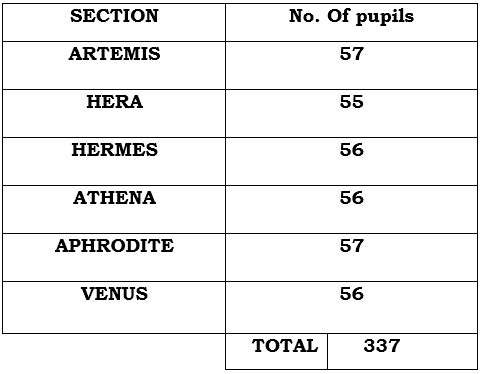
CHAPTER 4
Presentation, Analysis and Interpretation of Data
This part presents the data gathered, analyses and interpretation to answer the problem which this study aims to achieve.
1. The impact of social interaction and collaborative skills of students in an academic setting.
Table 1 present the impact of social media interaction and collaborative skills of students in an academic setting. Based on the ten (10) indicators which are presented to the respondents during the conduct of the survey, the highest weighted mean is the respondents answers regarding interested in how peer discussions in gaming affects student's academic performance with weighted mean of 3.17 (SD=2.66), Qualitatively describes as Agree. This means that they interest on academic performance when they peer discuss about gaming affects. However, wondering how gaming frequency related toon of motivation levels for schoolwork has the lowest weighted mean of 2.66 (SD=2.38) which means students wondering of frequency that related on toon of having a motivation level. This indicator is qualitatively described as Agree.
Overall result show that the respondents mark "agree" on their activities in online gaming with grand weighted mean of 2.95 (SD=2.56)
This result is related to the study conducted by Kevin Smits (2019) who studied the relation between online games and learning, that good games incorporate opportunities for the player to learn. For example, ways of problem solving.
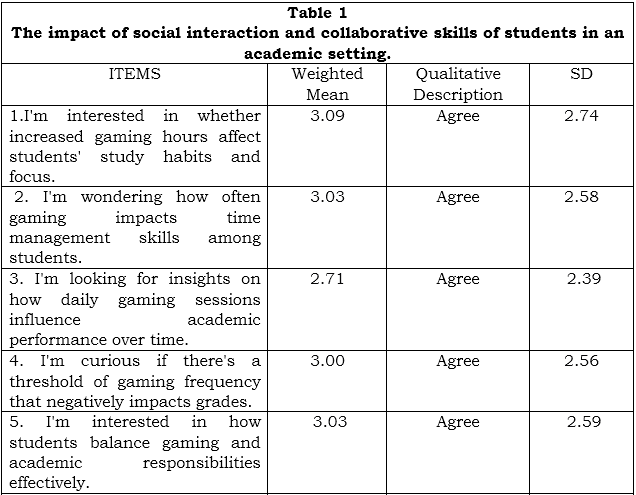
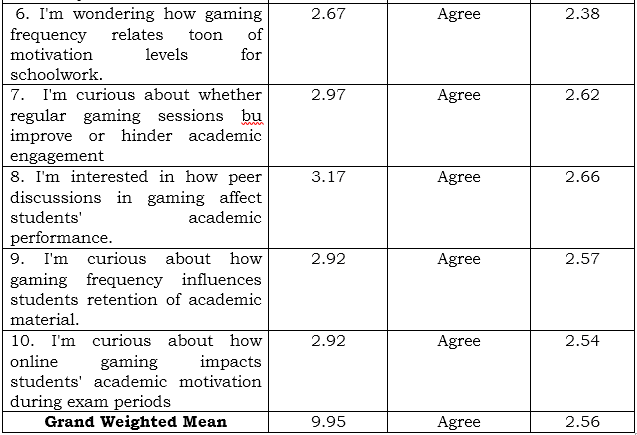
Table 2 present the influence of online gaming session impact students grades and overall academic achievement based on the (10) indicators which are presented to the respondents during the conduct of the survey m, the highest weighted mean is the respondents answers regarding who curious about how online gaming can improve communication skills among students with 3.21 (SD=2.66), Qualitative description as agree. This means that they interested about how online gaming can improve communication skills. However, wondering how gaming frequency related toon of motivation levels for schoolwork has the lowest weighted mean of 2.37 (SD=2.21) which means students wondering how competitive online games influence in academic settings. this indicator is qualitatively described as Disagree.
Overall results show that the respondents mark agree on their academic performance with grand waited mean 2.77 (SD=2.45).
These results related to the Jacobs, Jennifer (2016) Gamification, or adding game like elements to non-game activities, has been used widely in a variety of industries to motivate people and is a strategy that educators are now using to motivate students in coursework.
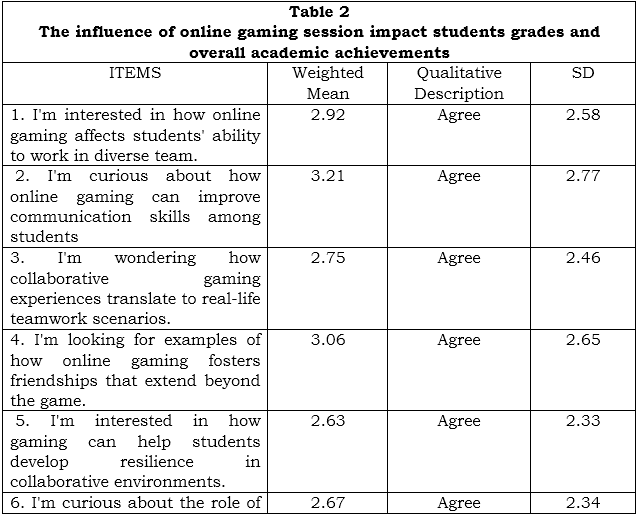
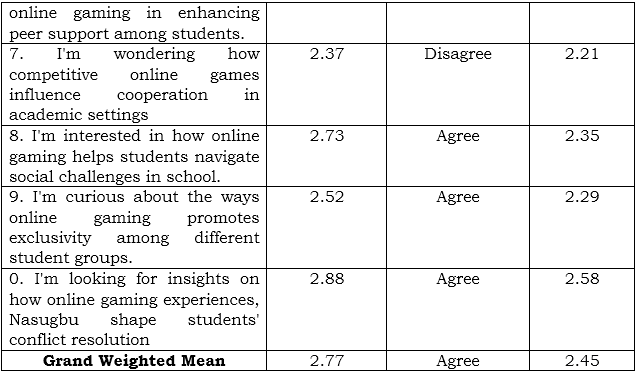
CHAPTER 5
This chapter presents the summary of findings, conclusion and recommendations of the study.
SUMMARY OF FINDINGS
1. Impact of online gaming in social interaction and collaborative skills of senior high school student in an academic setting. The findings shows that the respondents agreed on their on academic performance when they peer discuss about gaming effects with grand waited mean 3.17 (SD= 2.66).
2. The frequency of online gaming session impact the student with grand waited mean 2.66 (SD = 2.38) The findings shows that the respondents agreed and wondering related on toon of having a motivation level.
3. Learning activity sheets to improve students’ academic performance while incorporating online gaming. The researcher's proposed learning activity sheets to improve Students’ academic performance while incorporating online gaming.
CONCLUSIONS
Based on findings of study, the following conclusions are drawn:
Respondents are agreed with their activities in online gaming. Learning activity sheets are proposed to improve Students’ academic performance while incorporating online gaming.
RECOMMENDATIONS
Based on the proceeding findings and conclusions the following recommendations are going offered by the researchers:
1. Teacher should Incorporate game design elements into lessons to engage students. Use online platforms to create interactive quizzes, games, and challenges that align with curriculum standards.
2. Parents should Establish rules for gaming time and prioritize homework. Allocate specific times for gaming and monitor progress to ensure balance.
3. Student should Time management, prioritize tasks, allocate time for gaming and academic. create a schedule with dedicated blocks for homework, studying, gaming, and relaxation to maintain a healthy balance.
BIBLIOGRAPHY
Ahlussunnah: Journal of Islamic Education 2 (2), 63-69, 2023 Exploring the Impact of Online Gaming on Students Academic Engagement https://scholar.google.com/scholar?start=10&q=related:Ql_8HZ7v638J:scholar.google.com&hl=en&as_sdt=0,5#d=gs_qabs&t=1724288072362&u=%23p%3D5C5vmc3Nm88J
Anderson, C. A., & Dill, K. E. (2000). Video games and aggressive thoughts, feelings, and behavior in the laboratory and in life. Journal of Personality and Social Psychology, 78(4), 772-790. https://doi.org/10.1037/0022-3514.78.4.772
Demir and Kutlu, 2018; The effects of online game addiction on reduced academic achievement motivation. https://www.frontiersin.org/journals/psychology/articles/10.3389/fpsyg.2023.11 85353/full #ref22- Distraction in online gaming MC
Carras, A Kalbarczyk, K Wells, J Banks… - Social Science & …, 2018 Online gaming cause stress https://www.sciencedirect.com/science/article/pii/S0360131519300260
Gamification in an Online Course: Promoting student Achievement through Game-Like Elements. https://etd.ohiolink.edu/acprod/odb_etd/etd/r/1501/10?clear=10&p10_accession_num=ucin1468512095
Gaming for Grades: Gaming as a Pastime, School Performance and Self-efficacy https://scholar.google.com/scholar?hl=en&as_sdt=0,5&q=effects+of+online+games+on+students+academic+performance+input+hypothesis#d=gs_qabs&t=1727602509335&u=%23p%3DJ0q2g3i39vcJ
Green, C. S., & Bavelier, D. (2003). Action video game modifies visual selective attention. Nature, 423(6939), 534-537. https://doi.org/10.1038/nature01647
Griffiths, M. D. (2008). Internet gambling: Issues, concerns, and recommendations. International Journal of Mental Health and Addiction, 6(2), 43-50. https://doi.org/10.1007/s11469-007-9128-9 How leisure activities affect health: a narrative review and multi-level theoretical framework of mechanisms of action. https://www.ncbi.nlm.nih.gov/pmc/articles/PMC7613155/ https://www.google.com/url?sa=t&source=web&rct=j&opi=89978449&url=https://groups.psychology.org.au/Assets/Files/21(1)-King Delfabbro.pdf&ved=2ahUKEwjHia_8vriIAxUYsFYBHalVNtAQFnoECBUQAQ&usg=AOvVaw0i_z3JlFgjQ0vyFeZwjYWShttps://serc.carleton.edu/sp/library/cooperative/index.html https://www.sciencedirect.com/science/article/pii/B978012818697800011X https://www.ajhssr.com/wp-content/uploads/2022/11/O22611133143.pdf https://www.collinsdictionary.com/us/dictionary/english/stress-relief#:~:text=Definition%20of%20'stress%20relief'&text=Stress%20relief%20involves%20removing%20stresses,the%20stress%20in%20the%20casting https://bmcmededuc.biomedcentral.com/articles/10.1186/s12909-022-03461-0
Negative effects of online games on academic performance. https://scholar.google.com/scholar?hl=en&as_sdt=0%2C5&q=impact+of+online+games+in+academic+performance&oq=impact+of+online+games+#d=gs_qabs&t=1726143064732&u=%23p%3DB-ILHS3qI2IJ
Online Gaming and Its Impact on Academic Achievement: A Case Study of University Students" Chen, Y., & Lu, X. (2015) https://scholar.google.com.ph/scholar?q=Chen+%26+Lu+(2015)+rrl+academic+achievement&hl=en&as_sdt=0&as_vis=1&oi=scholart
PANDAWA 6 (1), 77-85, 2024 THE INFLUENCE OF ONLINE GAMES ON CHANGES IN STUDENT BEHAVIOR. https://scholar.google.com/scholar?hl=en&as_sdt=0%2C5&q=impact+of+online+games +in+student+&oq=#d=gs_qabs&t=1724507262791&u=%23p%3D_S0XWjzTZ4QJ Taking advantage of an extremely,
Xu, Z. et al. (2017) https://www.sciencedirect.com/science/article/pii/S0079642517300956 The Effects of Online Games on Student’s Academic Performance. https://www.researchgate.net/publication/373010342_The_Effects_of_Online_Games_on_Student's_Academic_Performance
The Effects of Online Games on Student’s Academic Performance https://www.researchgate.net/publication/373010342_The_Effects_of_Online_Games_on_Student's_Academic_Performance/link/64d39380c80b930269fb2b21/download?_tp=eyJjb250ZXh0Ijp7InBhZ2UiOiJwdWJsaWNhdGlvbiIsInByZXZpb3VzUGFnZSI6bnVsbH19 The effects of player type on performance.
Lopez, M. & Tucker, R. (2019) https://www.sciencedirect.com/scie The Impact of Video Games on Social Interaction. https://lawsonmatthew.medium.com/the-impact-of-video-games-on-social-interaction-9345c3e7bd23#:~:text=While%20video%20games%20can%20enhance,create%20a%20sense%20of%20isolation
Valkenburg, P. M., & Peter, J. (2011). Online communication and the quality of friendships among adolescents. Journal of Adolescence, 34(3), 561-573. https://doi.org/10.1016/j.adolescence.2010.05.002 Vasalampi, K., Salmela-Aro, K., & Nurmi, J. E. (2009). Developmental trajectories of school burnout: A longitudinal study among Finnish adolescents. Learning and Individual Differences, 19(4), 299-308. https://doi.org/10.1016/j.lindif.2008.10.001
Vasalampi, K., Salmela-Aro, K., & Nurmi, J. E. (2015). Developmental trajectories of school burnout: A longitudinal study among Finnish adolescents. Learning and Individual Differences, 19(4), 299-308. https://doi.org/10.1016/j.lindif.2008.10.001
Yee (2018) Effects of Online Games in the Academic Performance of Selected Grade 12 Students of General Academic Strand at Bestlink College of the Philippines. https://scholar.google.com/scholar?q=related:B-ILHS3qI2IJ:scholar.google.com/&hl=en &as_sdt=0,5#d=gs_qabs&t=1724473831991&u=%23p%3DBmRUxybJPnwJ